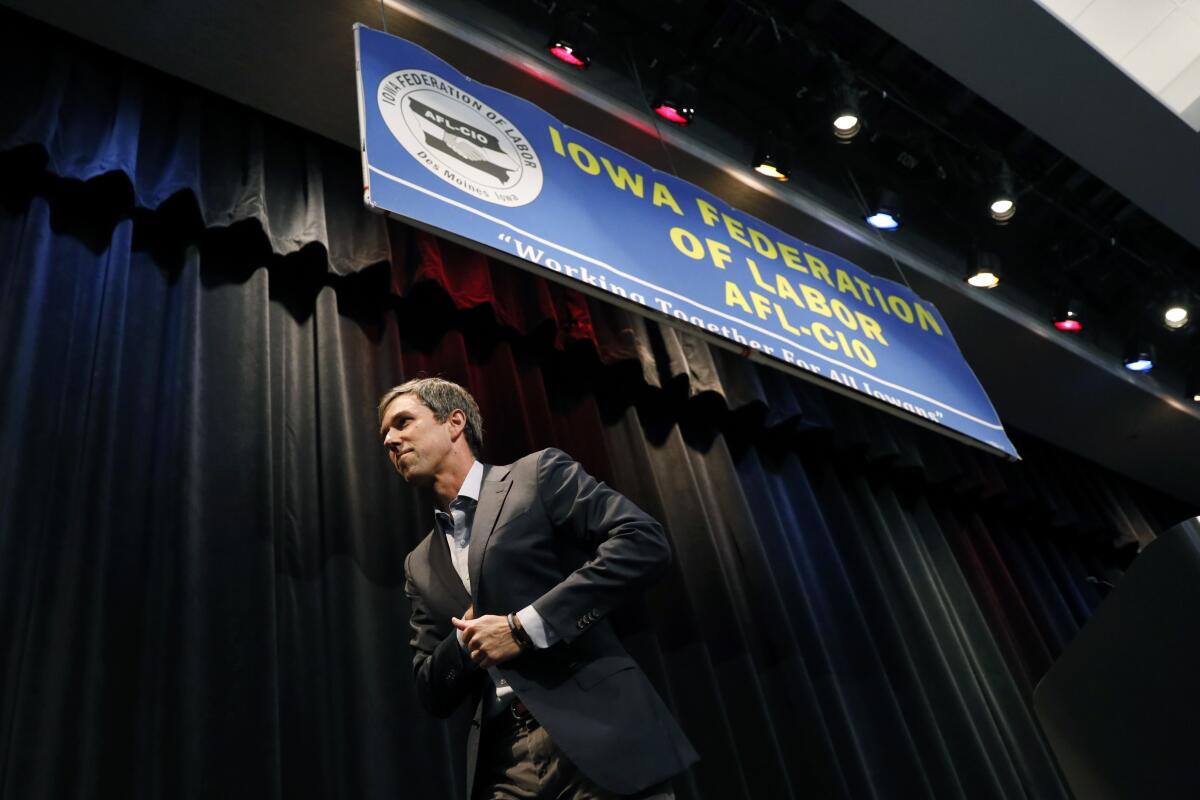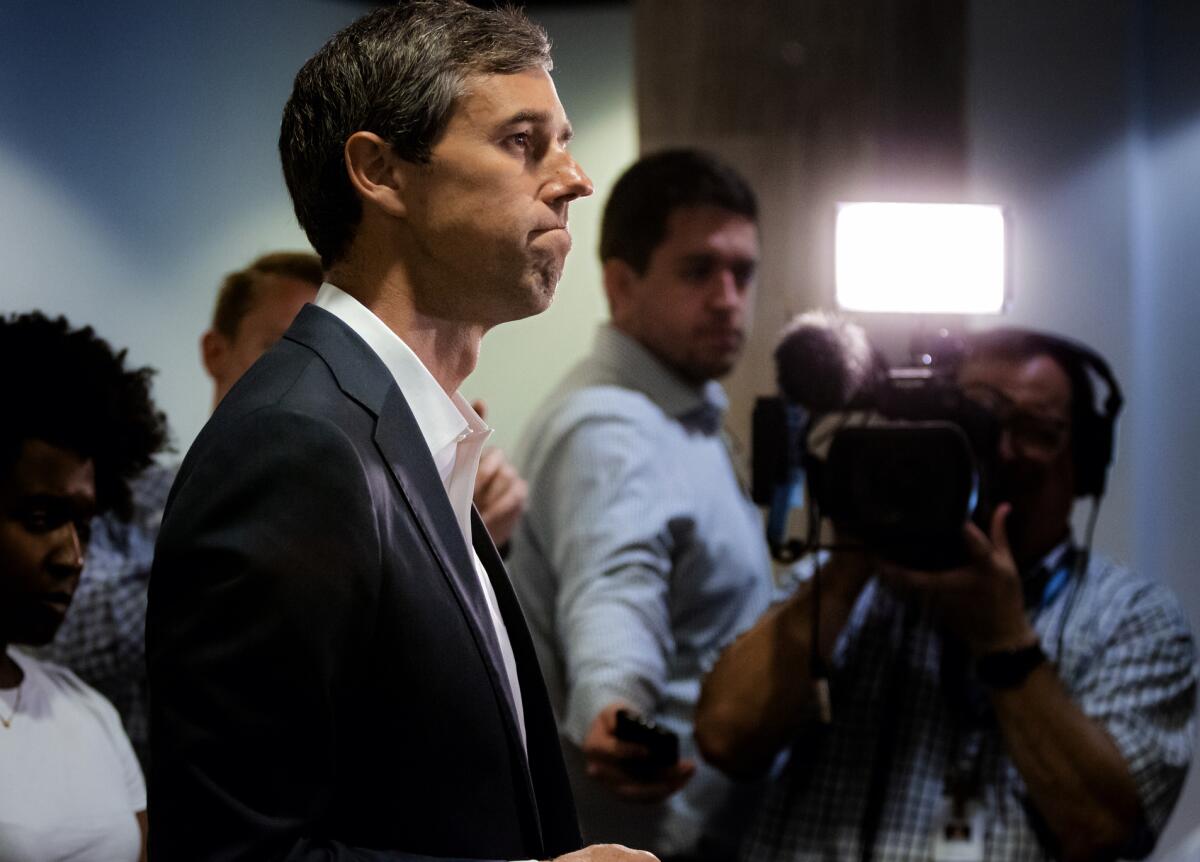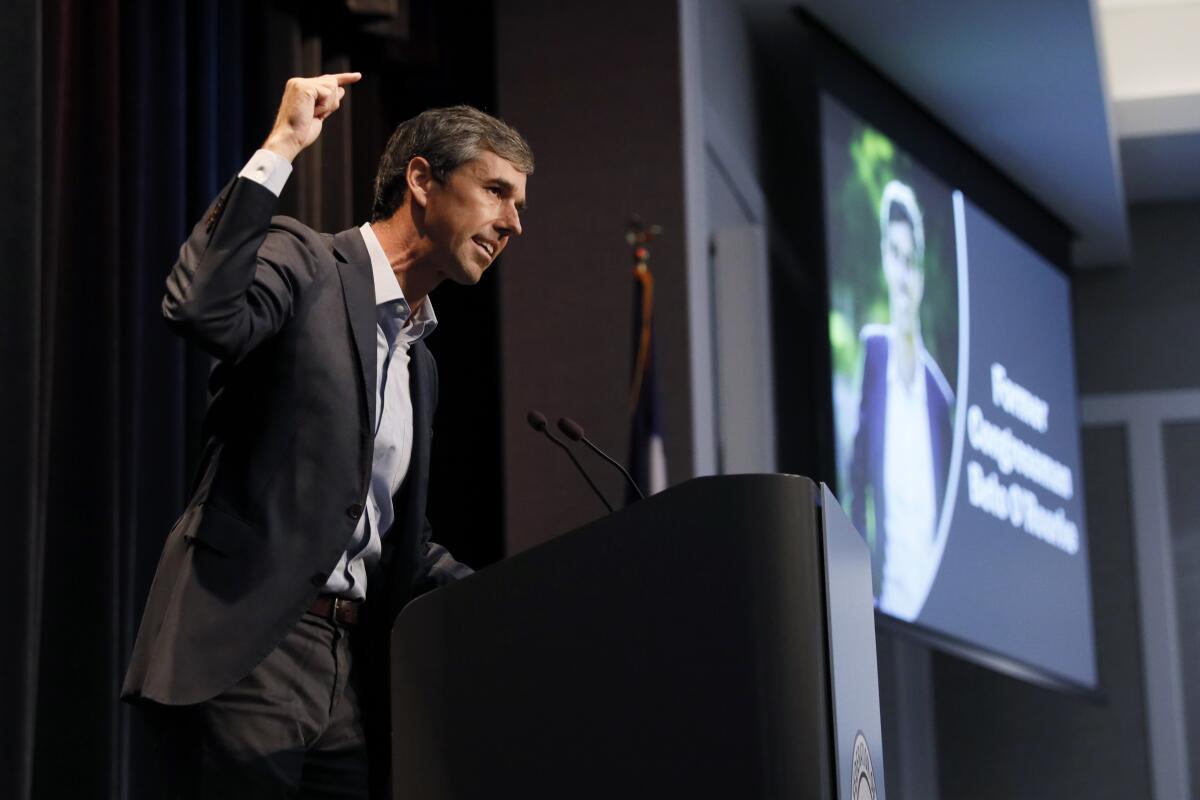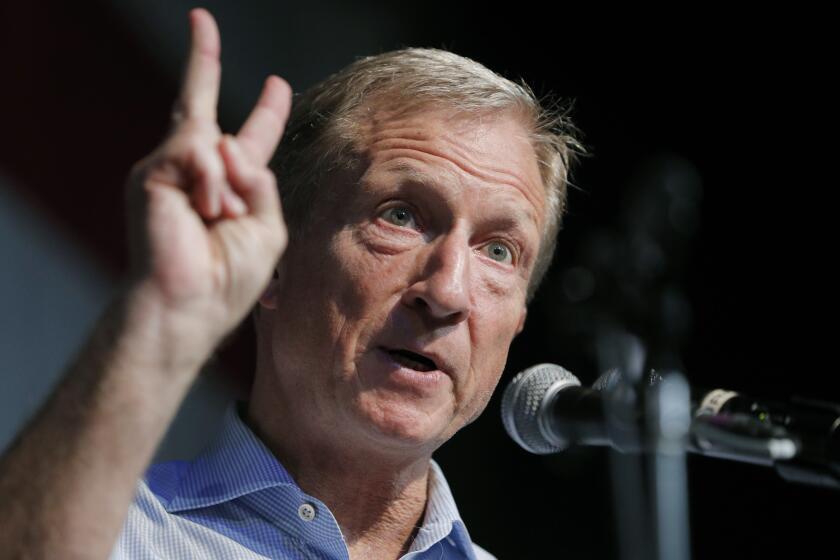Beto O’Rourke has chucked the presidential playbook. Will it save his campaign?

MARSHALLTOWN, Iowa — Beto O’Rourke was angry, standing with his back to the wall.
He compared President Trump to a dictator and the country to Germany in the days before its dark descent into Nazism.
“If we fail to connect the dots, then we will lose America,” the Democratic presidential hopeful told reporters as he stood before the faux adobe of a Mexican grill in this rural outpost in central Iowa. “We will have fascism in the United States, as hard as that is for many people to believe. It is happening right now, every day, during this administration.”
O’Rourke entered the presidential race with an exuberant burst, but he’s fizzled since: His fundraising has been mediocre, debate performances uninspired, poll numbers cringingly low.
After a pause following the mass shooting in his native El Paso, the former Texas congressman is now attempting to relaunch his campaign with a focus on gun violence, immigrant rights and the dangerous toxicity, he says, that oozes from the White House.
It may be his last stand.
O’Rourke promises to follow an unconventional path, as he did in his near-miss 2018 Senate campaign, away from the usual early-voting states and rutted tracks of his many competitors. “To those places,” he said, “where Donald Trump has been terrorizing and terrifying and demeaning our fellow Americans.”
His road tripping has so far taken him to a gun show in Arkansas, a Mississippi town torn by an immigration raid, a shelter for homeless veterans in Missouri and, in Oklahoma, the scenes of a 1920s massacre of African Americans and the 1995 bombing of a federal building by domestic terrorists.
Struggling Democratic presidential candidates are facing the bad news that they are not among the 10 who have qualified for the next debate, a predicament that is likely to spell doom for their campaigns.
“It certainly feels like the right thing to do,” he said, grinning broadly after hosting a recent roundtable discussion on gun control at the Iowa Capitol, “and so I’m doing it with all that I’ve got.”
There is, of course, no shortage of Democrats willing to vilify the president. Other White House hopefuls also support stiffer gun laws and a more humane immigration policy, the tent poles of O’Rourke’s refashioned candidacy.
What sets him apart, in this particular moment, is the sense of bearing personal witness: To the massacre of former constituents targeted at a Walmart because they were Latino; to the notion of sister cities — El Paso and Ciudad Juárez — living in peaceable harmony along the U.S.-Mexico border. “Three million in this little river valley,” he rhapsodized at a stop in Des Moines, “in the middle of the Chihuahuan desert at the foot of the Rocky Mountains.”
Terrible as it was, the tragedy in El Paso has provided O’Rourke a chance for a do-over and some saw in his initial response — raw, anguished, profane — glimmers “of the Beto we knew” from 2018, as several put it. Amanda Allen, who followed his Senate campaign online, was intrigued enough to come see the candidate when he stopped by Des Moines’ Grand View University.

“That’s different from what a lot of folks are doing,” Allen, 33, said of O’Rourke’s trips to Arkansas and Oklahoma, deeply red Republican country. “I think he’s one of the most thoughtful candidates and most self-reflective and clearly he’s been doing some thinking these past few weeks.” (Still, she said it’s too early to commit.)
What also sets O’Rourke apart is his age, a relatively young 46, and kinetic energy.
In person there’s a physicality absent from his desultory performance on the debate stage or TV’s political chat shows. The veins bulge in his neck as he stabs and karate chops the air to make a point, his body bobbing and swaying like a jacked-up marionette.
Even in Iowa, which casts the first votes of the 2020 campaign and is aswarm with candidates, O’Rourke strayed from the usual route. His visit to River Bend made him, by local accounts, the first presidential candidate since Jimmy Carter to go door-to-door in the neighborhood north of downtown Des Moines, which is poorer and blacker than most of the city.
Some candidates treat campaigning as an obligation, as though it were a school assignment they must grudgingly complete. O’Rourke is like the kid who asks for extra homework.
After 10 minutes speaking to the Iowa Labor Council in Altoona, he spent even more time talking to young activists he spotted on the way out of the convention hall, a dozen in fire-engine red T-shirts who came to wave signs calling for a $15 minimum wage and posed for several boisterous group shots with the candidate.
After door-knocking and then dinner at a Des Moines soup kitchen, he addressed a crowd of 50 or so inside a community services office, continued the conversation with passersby on the sidewalk, then dashed over to engage gawkers watching from the entryway of an apartment house across the street.
O’Rourke’s political celebrity grew from his Senate run, when he raised an astonishing $80 million and turned in the strongest statewide performance of any Texas Democrat in nearly three decades. Inevitably, there were calls to try again in 2020, which O’Rourke spurned in favor of a long-shot run for president.
The calls resurfaced, more beseechingly, after the Aug. 3 killings in El Paso — “Beto, come home,” the Houston Chronicle editorialized, “Texas needs you” — and he once more rejected them, emphatically.
“That would not be good enough for this community,” he said before leaving to resume campaigning. “That would not be good enough for this country.”
Days later, when he addressed Iowa’s labor convention, it seemed a perfect chance to unveil his plan to boost wages and spur union organizing. Instead, he spoke with heated passion of El Paso’s mass shooting, painting Trump as an accomplice of the rage-filled gunman.
The fact the killer was fueled by “fear and hatred and racism,” which O’Rourke traced to the White House, “is important for all of us to know,” the Democrat said to polite silence, “if we are going to not accept it simply as an act of evil, or a force of nature or something we cannot prevent.”
He released his labor agenda the following day, in a written statement issued without fanfare or public discussion, which, O’Rourke conceded, was unusual.
“The temptation for any candidate is to enumerate a dozen or more policy points that you’re going to deliver for that given constituency that is in front of you,” he told reporters. “But what was on my mind and in my heart was what has just happened in El Paso.”

His time in Iowa lasted only about 48 hours and while aides say O’Rourke plans to return often enough to compete, he insists he won’t camp out in the earliest-voting states, which include New Hampshire, Nevada and South Carolina, the way others candidates have.
The risk is ceding those states — and any shot at the Democratic nomination — by spurning voters accustomed to the lavish attention that comes with their privileged spot on the political calendar.
Chuck Brooke, for one, said he needs to meet a candidate before he’s comfortable giving his support.
“Seeing them on television is fine,” the 74-year-old retiree said over chips and salsa as he awaited O’Rourke’s arrival to discuss immigration with locals at Marshalltown’s La Carreta Mexican Grill. “But you like to be able to sit across from them and have them look you in the eye.”
Customs may be changing, though, as a new generation of Iowans, incited by Trump’s presidency, get politically involved.
“They’re not used to decades of caucus-pampering,” said Sean Bagniewski, 36, the Democratic chairman in Polk County, which takes in Des Moines and surrounding areas. Just a chance, or two, to see a candidate in person may be enough, he suggested, for younger activists who want a candidate to show their wherewithal by campaigning elsewhere around the country.
“If you completely abandon Iowa, they’ll be furious,” Bagniewski said. “But they’ll be furious if you spend too much time in Iowa.”
O’Rourke will have at least a few more months to pursue what amounts to his political science experiment; a coveted spot on the Democratic debate stage in September and October assures him that much.
“I see part of my responsibility in calling attention to this,” O’Rourke said of the line he draws between Trump and bigotry and bloodshed, and he views his travels as a means of shining a spotlight.
Before leaving Marshalltown he made a point of reading aloud the message printed on his luncheon receipt. “Immigrants make America great,” it said. “They also cooked and served your food today.”
More to Read
Get the L.A. Times Politics newsletter
Deeply reported insights into legislation, politics and policy from Sacramento, Washington and beyond. In your inbox three times per week.
You may occasionally receive promotional content from the Los Angeles Times.











